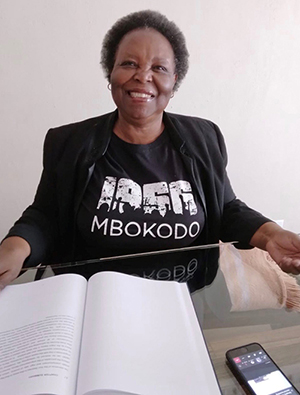
Producing over 40% of teachers in South Africa

Dr Gladys Kedibone Mokwena
Mountains represent power, tenacity and permanence. This applies also to the site of the University of South Africa's Muckleneuk Campus – the institution is advantageously positioned on a hill for all humankind to view, draw strength from and develop resilience from its vision to shape futures in the service of humanity.
As a Unisa alumnus, I first encountered the challenge of climbing this mountain as a correspondence student in the 1980s. As I recall, the queues to register for courses and collect study material from Despatch, I could have viewed it as adversity that could have been a major obstacle in my life.
In contrast, I chose to view it as a source of strength and endurance. I have changed positions to a lecturer at the same university, which is now a fully operational open distance and e-learning (ODeL) university. This is the story of how, as a lecturer, I endured adversity and gained resilience. I had worked as a teacher/facilitator in many contexts but did not have a doctoral degree at the time.
As a career woman, widow and single mother, I experienced challenges such as raising two children on my own and keeping the household going. A requirement for becoming a lecturer in my new academic journey was to supervise postgraduate students; therefore, I had no choice but to register for a doctoral programme and study alongside the students that I supervised.
As I completed my master's degree several years ago, my research study skills had decreased, making it more difficult for me to adjust to the new academic environment. As a new academic and novice to the higher education environment, I had to teach four modules in higher certificate and diploma courses, as well as one in youth development.
It appears that the number of challenges I was facing was increasing; however, with the help of a seasoned scholar, I executed the key performance areas agreed upon. Even though I was completely overwhelmed as a lecturer, there was no way out. Instead, I was determined and selected the tenacious path to adapt to my new environment.
I realised that resilience meant more than just overcoming hurdles; I had to relate my views of risks and difficulties to my ability to adapt and overcome them. From this viewpoint, I connected autonomy, time management, goal setting and a sense of purpose and resilience. I then decided to take command of my new learning environment and blend it with my existing knowledge.
With financial assistance from the university's Master and Doctoral Support Programme (MDSP) and a National Research Fund (NRF) grant, I knew I would have to combine my studies with my teaching responsibilities. My research was strengthened by the numerous training interventions provided by the Unisa Research Innovation Directorate and the College of Education’s management.
Despite the obstacles, I achieved one of my life goals when I completed my doctoral degree in October 2018. My predecessors encouraged me to accomplish my academic aspirations. It was hard to climb the mountain, but it was certainly worth it.
I transitioned from Mrs to Dr Kedibone Mokwena and want to thank the CEDU management and colleagues for their support. As I now exit the formal work environment, I look back at a unique academic career, which strengthened me to complete my life's goals before retiring to pursue other interests.
Throughout my academic career, I have engaged with students in a variety of settings, including community learning, correctional centres and open distance and e-learning. Without a question, resilience paved the way for me in the academic realm. I am continually working hard to improve not only my research and related skills but also my ability to learn in a dynamic and integrated manner.
The abrupt changes caused by the Covid-19 pandemic taught us that resilience would help students to make the most of their education. It has the potential to be a useful tool for student support as well as assisting individuals in coping with the ever-changing teaching and learning environment. My message to the reader is to learn to rest but not to give up if you become exhausted.
Kudos to the African universities on shaping futures in the spirit of humanity.
Gladys Kedibone Mokwena is a senior lecturer in the College of Education at the University of South Africa. Her interests include adult education and training for social justice, particularly women in non-formal vocational training programmes and empowering individuals in various communities.
Publish date: 2021-06-05 00:00:00.0